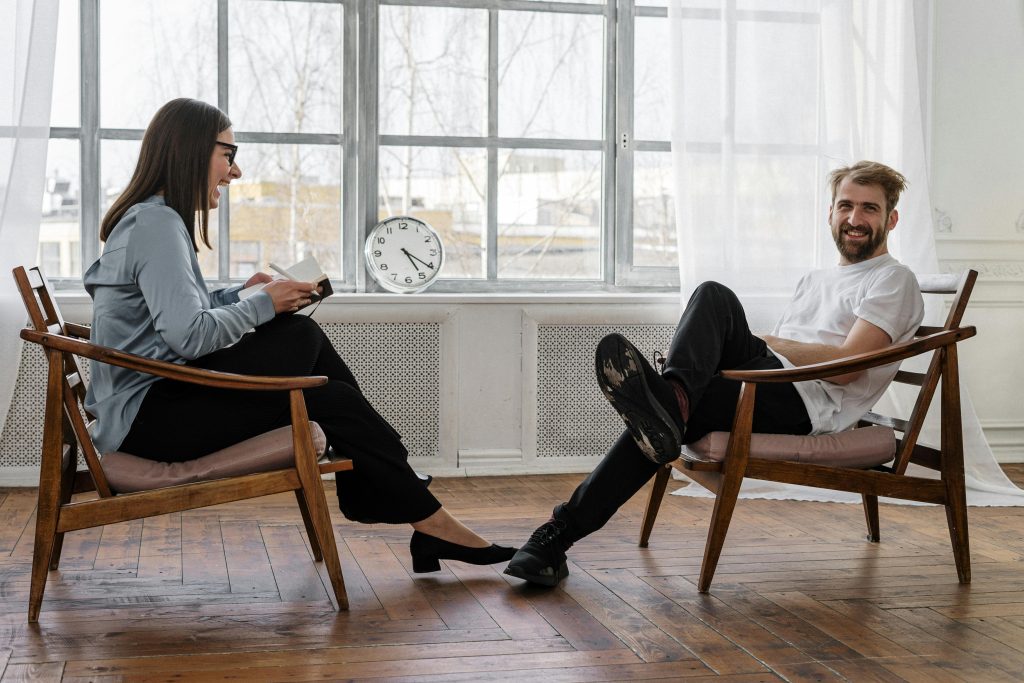WHAT WE DO Personal Growth and Mental Health Support
We are a team of professionally qualified therapists that offer personal growth and mental health support counselling either face-to-face or remotely via video calls to suit our clients preferences.

What Is Counselling?
Counselling can help in many ways, and it is an individual experience. For some it offers a supportive and empathic space to both self-reflect, talk, and develop for self. For others, therapy can offer insight about your experiences, feelings, thoughts and behaviours that may be unhealthy and are restricting you to live your life to its full potential. This can be achieved though our personal growth and mental health support challenging unhealthy thoughts, feelings, and behaviours and learning alternatives, as well as strategies and coping mechanisms.
Our Team.
All our therapists are professionally qualified and experienced in a wide range of issues and uphold a professional commitment for continued professional development to enhance the service and skills they offer. Our counsellors aim to empower clients to find and strengthen their emotional health, learn, regain values and beliefs and gain control of their life. We help to support you and guide you as you discover your new self.
What To Expect.
Firstly, we wish to collect some initial details about you, either by our online form or over the phone. By telling us your issues or what you would like to receive from counselling, we would then assign a counsellor matching your requirements. In your first appointment, your counsellor will listen and learn about you and the issues that you are experiencing, then over the course of your sessions, you will work together to help build resilience, confidence, space to heal, restore and grow.
When things have become too much to manage on your own, personal growth and mental health support counselling can offer the space to talk, explore and understand feelings, emotions and thoughts that are affecting you, or experiencing issues such as, anger, grief, guilt, and identity issues.
In the initial session your therapist will explore your expectations of counselling, goals you wish to achieve, and whether counselling is able to offer you the support you require. Both counsellor and client will discuss the therapeutic relationship and plan the process of working together.
In your sessions a safe, authentic, and confidential environment will offer you the space to further explore your thoughts, feelings and emotions and the counsellor will encourage and respect your views. This encouragement and support from the counsellor will help you to gain a better insight and understanding into what is affecting you and ways of managing these issues.
What are the benefits?
Benefits of personal growth and mental health support: being heard and understood in an authentic, non-judgemental safe and confidential environment enables to you to confront, understand, and share your thoughts, feelings and emotions as well as offering relief and help to manage or overcome issues that are affecting you.
We cover issues such as: abortion, abuse (sexual, physical, or emotional), anger issues and management, anxiety, bereavement, bullying, confidence, low self-esteem, panic attacks, phobias, Post-Traumatic Stress Disorder (PTSD), relationship issues (divorce, marriage problems, or friendship issues), self-harm, sexuality or gender issues, sleep issues, stress, trauma, and work related issues such as redundancy, promotion, dismissal, bullying.
Telephone and video counselling offers you a way of accessing counselling in a location and environment of your choice at a time suitable for you. At Internal growth we invite you to make yourself as comfortable as possible and create your own environment where you wish to receive counselling and for some of our clients this includes their favourite spot in their garden, a favourite room, seat, or settee, or laid on top of their bed.
Benefits of this type of counselling:
This form of therapy offers a trained therapist to listen and support you to gain further insight and managing and overcoming issues you wish to change.
Counselling via telephone or video call is the same with the difference being you are not face to face in a room and not requiring you to travel. Phone and video calls can help with a range of issues such as: anger, anxiety, depression, confidence, low self-esteem, grief, bullying, stress, the list is non-exhaustive.
Clients who receive this type of therapy may find it beneficial talking via telephone or video call rather than being face-to-face and offers the client to be more open about their feelings, thoughts, and behaviours.
This is a short to medium term therapy that identifies and challenges unrealistic and negative thought patterns and behaviours, replacing them with realistic and helpful thoughts and behaviours to enable a more fulfilling and positive well-being. CBT focusses on the present day and not necessarily on past experiences. Thoughts, feelings and behavioural patterns are the focus and area of development, by challenging them and learning alternative and realistic ones.
This approach requires a collaborative approach from the client and counsellor to asses how the client views themselves, the world and others and how this impacts emotions, feelings and behaviours. By identifying distorted or unrealistic thoughts, emotions and behaviours, both counsellor and client can explore how to break the cycle and learn alternative ones as well as positively managing solutions and issues.
Benefits of this type of counselling:
This approach informs clients how to become aware, manage and take control of their emotions, thoughts and behaviours leading to a positive well-being. The approach is well known and favoured by the NHS and has lots of empirical evidence for its effectiveness.
CBT therapy is suitable for:
Helping anxiety and depression, additions, anger issues, Obsessive Compulsive Disorder (OCD), social and health anxiety, phobias, post-traumatic stress disorder, low self-esteem, panic attacks, eating disorders and sleep disorders.
Integrative Counselling acknowledges the client as a ‘whole person’, assessing individuals’ issues from a holistic perspective and recognising the different elements that make up psychological well-being. An integrative counsellor approach recognises and utilises the following main counselling theories:
Humanistic Theory – This theory places significance on being authentic to yourself and feelings to lead a positive and healthy life. It recognises that individuals are unique and so is their outlook on the world which can impact our actions and choices.
Cognitive Behavioural Theory – A talking therapy that identifies those thoughts, actions and feelings are interconnected and negative thoughts can easily leave you feeling trapped in a vicious cycle.
Mindfulness – Mindfulness promotes being in the here and now and having awareness of what we are doing and where we are and not being reactive to external stimulus. Mindfulness teaches us to be open to situations, to remain calm opposed to reacting negatively when things do not go to plan, and thoughts are not brief and do not guide your emotions or behaviour.
Psychoanalytical Therapy – This identifies the importance of the past and issues that are rooted within the unconscious mind. It works by acknowledging that anxiety and depression can be caused from repressed trauma or issues dating back to childhood.
Working Integrative – Counsellors will utilise skills and tools appropriate to the client’s presenting issues and not just one approach can assist a client, but multiple approaches, tailored to the clients’ issues.
Benefits of this type of counselling:
This approach enables the counsellor to provide the client with a therapy that is suitable for them as it focuses on behavioural, affective, cognitive and physiological levels of functioning. The approach is based on theories, techniques and ideas that are backed by scientific evidence. It is also considered to offer an in-depth and emotionally charged therapeutic experience due to it exploring all parts; mind, body, brain, the conscious and the unconscious.
Integrative Counselling is suitable for:
Addiction, depression, anxiety, trauma, bereavement, Post-Traumatic Stress Disorder (PTSD), panic attacks, eating disorders, sleep disorders, phobias and Obsessive Compulsive Disorder (OCD).
At certain times in life we may find that a relationship has become an unpleasant environment for either one or both persons involved, this can be due to an affair, growing apart, a change of interest, or finding nothing in common with each other. Couples may seek counselling when there are changes in physical or mental health, grief or loss, career changes, domestic abuse, influence of other family members, financial change, and lack of communication. When these issues are left unattended, relationships can deteriorate or break down.
When participating in couples counselling the therapeutic process involves recognising and managing differences, conflicts, and triggers that result in distress. The process identifies that each person has their own perception, opinions, and set of values and beliefs that may be different and conflict with their partners. These differences may be a result of influences from childhood, social or religious values that lead to an individual’s personality or behaviour.
The process will involve the counsellor outlining the process and confidentiality, as well as discussing your expectations and asking for a brief history of the relationship and issues occurring within it. The counsellor is impartial and non-judgemental within the process and creates an environment to explore, discuss thoughts, beliefs, emotions, feelings and behaviours.
In each session the counsellor will de-escalate any conflict and tension and offer practical or realistic solutions and assess personal and relational content mentioned within the session. They will also invite time for reflection and discussion for effective and sustainable change.
How does this help?
By exploring, evaluating and sharing thoughts, emotions, behaviours, beliefs and values together. All within a confidential, safe and constructive environment, Couples Counselling offers the opportunity to:
Identify new methods to enhance and move your relationship forward through clear and open communication with one another.
Acknowledge and learn to compromise and negotiate with one another, and work through conflict and issues as it arises.
Use learned and appropriate expression, behaviours and disclosure to resolve emotions that are distressing.
By using positive and appropriate communication, gain the confidence to voice concerns leading to an enhanced and positive relationship.
The aim of couples counselling is to strengthen and rebuild the relationship with the objective of staying together. However, some couples opt to separate and counselling can assist to make the process amicable.
Couples counselling does require both parties to be actively involved demonstrating an effort to work together to resolve conflict and achieve the outcomes set at the beginning.
GRIEF AND LOSS.
We can experience loss in many forms, the most recognisable one usually being a person of significance or someone close to us. However, loss comes in other forms such as friendships, pets, work and identity.
Self-Esteem.
If your confidence and self-esteem are affected we can explore the origins of this change and work together to look at strategies, interventions and goals to becoming a more self-aware, assertive and confident person.
RELATIONSHIPS.
Friends, family, work and partners are al types of relationships that we may experience in our everyday lives. How these relationships are received, perceived and experienced can affect us. Counselling can offer insight into how these relationships are a part of your life and needs, and help you gain a new perspective.
ANXIETY AND STRESS.
Stress and anxiety commonly have underlying triggers or causes to why we experience either or both. The list is non-exhaustive, but a few examples are work, relationships, lifestyle changes or phobias.
